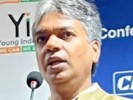The Maha Vikas Aghadi (MVA) coalition in Maharashtra – comprising the Shiv Sena (Uddhav Balasaheb Thackeray), the Sharad Pawar faction of the Nationalist Congress Party (NCP), and the Congress – finalised its seat-sharing pact for the key battleground state earlier this week.
Its primary rival and the state’s ruling Mahayuti alliance has yet to finalise its seat-sharing arrangement.
Over the past five years since the last election, the political dynamics of the state have changed completely, with both the Shiv Sena and the NCP suffering a split.
As things stand, the two rival factions of the parties are split between the MVA (part of the I.N.D.I.A bloc) and the Mahayuti (part of the NDA).
In this new political landscape, the seat-sharing negotiations become all the more crucial.
According to the MVA arrangement, the Shiv Sena (UBT) will be contesting from 21 of Maharashtra’s 48 seats, making its share the biggest among the three allies. The Congress, meanwhile, will field candidates from 17 seats, and the NCP (Sharad Pawar) from 10.
All three MVA players are contesting fewer seats than they did in 2019: Shiv Sena Uddhav (-2), Congress (-8), and NCP Sharad Pawar (-9).
In the 2019 Lok Sabha polls, the united Shiv Sena contested with its former ally BJP, and the Congress with the NCP.
Following the split in the Shiv Sena and the NCP, the Congress has become the default No. 2 in Maharashtra after the BJP.
With 13 of the Sena’s 18 MPs elected in 2019 shifting to the rival Eknath Shinde faction, it came as a surprise when the Congress settled for fewer seats than Sena (Uddhav).
Seats like Sangli, which were being claimed by the Congress, have been given to Sena (Uddhav faction).
This step of the Congress has led to discontent in its ranks. Before the seat-sharing was finalised, former Mumbai chief Sanjay Nirupam had raised the banner of revolt over Sena's seat claims and was eventually suspended.
The seat-sharing arrangement has also been questioned by former Maharashtra chief minister Ashok Chavan, now a BJP member.
“The Congress is the only national party in the Maha Vikas Aghadi (MVA) alliance. If it is allocated only 17 seats and even Sangli has to be vacated, then the party’s leadership must reflect on this,” he said. “The limited number of seats allotted to the party indicates a weakening of leadership, worsened by internal dissent and factionalism.”
ALSO READ | Opinion: Rahul Gandhi Faces An Interesting Fight In 'Safe' Wayanad This Time. Can Left And BJP Give Him A Scare?
So, why exactly was the Shiv Sena (Uddhav) assigned a higher share than the other MVA partners, despite the fact that Uddhav has lost the party name and symbol to the Shinde faction after an intense contest in the Election Commision of India?
The loss of the symbol could cost the Shiv Sena some of its vote in the rural segments, where many still identify parties by symbols, even as Uddhav strategists argue that disseminating information about symbol change is not that difficult a task in the age of social media.
There are other factors too. In any alliance, the key question is seamless transfer of votes between parties and ‘leakage’ on account of voter disenchantment with the alliance.
In this light, an important question for the MVA is, would the Congress-NCP’s Muslim voters – an estimated 77% voted for the UPA in 2019 – vote for Sena (Uddhav)? While Uddhav may have emerged as a more moderate face of the party, the Sena’s history is rooted in staunch Hindu nationalism.
Will this result in a reduction in voter turnout, or will the minority vote take a split, with Muslims instead turning to other players, like Prakash Ambedkar’s Vanchit Bahujan Aghadi (VBA) or Asaduddin Owaisi’s All India Majlis-e-Ittehadul Muslimeen (AIMIM)?
Sena (Uddhav) is contesting 44% of the seats, and the vote-transfer question could be a significant determinant in the MVA’s overall performance.
There has been no clarification from the Congress, but yielding a higher number of seats to Sena (Uddhav) is being seen as a result of the central leadership’s reluctance to play spoilsport after suffering setbacks with I.N.D.I.A allies in Bengal and Punjab, where the Trinamool Congress and the Aam Aadmi Party, respectively, have declared plans to go solo.
It wanted this alliance to work at any cost, and hence the accommodative role, in line with what has been demanded of the Congress by others.
Even so, this arrangement has created another risk for the Congress, in that it can be used by Sena (Uddhav) as a benchmark for negotiations for the Vidhan Sabha elections later this year.
By allowing Shiv Sena (Uddhav) the bigger share, the Congress has in a way conceded that Uddhav is the captain, in both the national as well as state elections, of the I.N.D.I.A bloc.
The author is a political commentator.
[Disclaimer: The opinions, beliefs, and views expressed by the various authors and forum participants on this website are personal and do not reflect the opinions, beliefs, and views of ABP Network Pvt. Ltd.]





















 Toi Staff
Toi Staff Gideon Levy
Gideon Levy Belen Fernandez
Belen Fernandez Andrew Mitrovica
Andrew Mitrovica Mort Laitner
Mort Laitner Rami G Khouri
Rami G Khouri Ali Fathollah-Nejad
Ali Fathollah-Nejad Nikkei Editorial
Nikkei Editorial
